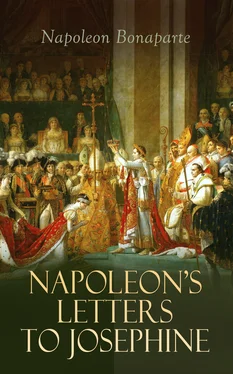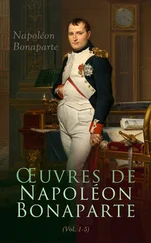" Letter from Archibald Constable to Sir Walter Scott.
August 30, 1825.
"I have had various conversations with Mr. Thomson on the subject of Napoleon's correspondence with Josephine. Mr. Thomson communicated with Count Flahault for me in the view of its being published, and whether the letters could not, in the meantime, be rendered accessible. The publication, it seems, under any circumstances, is by no means determined on, but should they be given, the price expected is five thousand guineas, which I should imagine greatly too much. I have an enumeration of the letters, from whence written, &c. I shall subjoin a copy of it."
When they were finally published in 1833, they seem to have been stimulated into existence by publication of the Mémorial de Saint-Helène , better known in England as Las Cases . Doubtless Hortense only allowed such letters to be published as would not injure the reputation of her mother or her relations. In the Preface it is stated: "We think that these letters will afford an interest as important as delightful. Everything that comes from Napoleon, and everything that appertains to him, will always excite the lively attention of contemporaries and posterity. If the lofty meditation of philosophy concerns itself only with the general influence of great men upon their own generation and future ones, a curiosity of another nature, and not less greedy, loves to penetrate into the inmost recesses of their soul, in order to elicit their most secret inclinations. It likes to learn what has been left of the man , amid the preoccupations of their projects and the elevation of their fortune. It requires to know in what manner their character has modified their genius, or has been subservient to it.
"It is this curiosity that we hope to satisfy by the publication of these letters. They reveal the inmost thought of Napoleon, they will reflect his earliest impulses, they will show how the General, the Consul, and the Emperor felt and spoke, not in his discourses or his proclamations—the official garb of his thought—but in the free outpourings of the most passionate or the most tender affections.... This correspondence will prove, we strongly believe, that the conqueror was human, the master of the world a good husband, the great man in fact an excellent man.... We shall see in them how, up to the last moment, he lavished on his wife proofs of his tenderness. Without doubt the letters of the Emperor Napoleon are rarer and shorter than those of the First Consul, and the First Consul writes no longer like General Bonaparte, but everywhere the sentiment is fundamentally the same.
"We make no reflection on the style of these letters, written in haste and in all the abandon of intimacy. We can easily perceive they were not destined to see the light. Nevertheless we publish them without changing anything in them."
The Collection Didot contains 228 letters from Napoleon to Josephine, and 70 from Josephine to Hortense, and two from Josephine to Napoleon, which seem to be the only two in existence of Josephine to Napoleon whose authenticity is unquestioned.
(3rd) The fugitive letters are collected from various sources, and their genuineness does not seem to be quite as well proved as those of the Tennant or Didot Series. We have generally taken the Correspondence of Napoleon I. as the touchstone of their merit to be inserted here, although one of them—that republished from Las Cases (No. 85, Series G.)—is manifestly mainly the work of that versatile author, who is utterly unreliable except when confirmed by others. As Lord Rosebery has well said, the book is "an arsenal of spurious documents."
We have relegated to an Appendix those published by Madame Ducrest, as transparent forgeries, and have to acknowledge with thanks a letter from M. Masson on this subject which thoroughly confirms these views. There seems some reason to doubt No. I., Series E, but being in the Correspondence , I have translated it.
The Correspondence of Napoleon I. is a splendid monument to the memory of Napoleon. It is alluded to throughout the Notes as The Correspondence , and it deserves special recognition here. Its compilation was decreed by Napoleon III. from Boulogne, on 7th September 1854, and the first volume appeared in 1858, and the last in 1870. With the first volume is inserted the Report of the Commission to the Emperor, part of which we subjoin:—
" Report of the Commission to the Emperor.
"Sire,—Augustus numbered Cæsar among the gods, and dedicated to him a temple; the temple has disappeared, the Commentaries remain. Your Majesty, wishing to raise to the chief of your dynasty an imperishable monument, has ordered us to gather together and publish the political, military, and administrative correspondence of Napoleon I. It has realised that the most conspicuous ( éclatant ) homage to render to this incomparable genius was to make him known in his entirety. No one is ignorant of his victories, of the laws with which he has endowed our country, the institutions that he has founded and which dwell immovable after so many revolutions; his prosperity and his reverses are in every mouth; history has recounted what he has done, but it has not always known his designs: it has not had the secret of so many admirable combinations that have been the spoil of fortune ( que la fortune a dejouées ), and so many grand projects for the execution of which time alone was wanting. The traces of Napoleon's thoughts were scattered; it was necessary to reunite them and to give them to the light.
"Such is the task which your Majesty confided to us, and of which we were far from suspecting the extent. The thousands of letters which were received from all parts have allowed us to follow, in spite of a few regrettable lacunæ , the thoughts of Napoleon day by day, and to assist, so to say, at the birth of his projects, at the ceaseless workings of his mind, which knew no other rest than change of occupation. But what is perhaps most surprising in the reading of a correspondence so varied, is the power of that universal intelligence from which nothing escaped, which in turn raised itself without an effort to the most sublime conceptions, and which descends with the same facility to the smallest details.... Nothing seems to him unworthy of his attention that has to do with the realisation of his designs; and it is not sufficient for him to give the most precise orders, but he superintends himself the execution of them with an indefatigable perseverance.
"The letters of Napoleon can add nothing to his glory, but they better enable us to comprehend his prodigious destiny, the prestige that he exercised over his contemporaries—'le culte universel dont sa mémoire est l'objet, enfin, l'entraînement irrésistible par lequel la France a replacé sa dynastie au sommet de l'édifice qu'il avait construit.'
"These letters also contain the most fruitful sources of information ... for peoples as for governments; for soldiers and for statesmen no less than for historians. Perhaps some persons, greedy of knowing the least details concerning the intimate life of great men, will regret that we have not reproduced those letters which, published elsewhere for the most part, have only dealt with family affairs and domestic relations. Collected together by us as well as the others, they have not found a place in the plan of which your Majesty has fixed for us the limits.
"Let us haste to declare that, in conformity with the express intentions of your Majesty, we have scrupulously avoided, in the reproduction of the letters of the Emperor, any alteration, curtailment, or modification of the text. Sometimes, thinking of the legitimate sorrow which blame from so high a quarter may cause, we have regretted not to be able to soften the vigorous judgment of Napoleon on many of his contemporaries, but it was not our province to discuss them, still less to explain them; but if, better informed or calmer, the Emperor has rendered justice to those of his servants that he had for a moment misunderstood, we have been glad to indicate that these severe words have been followed by reparation.
Читать дальше












